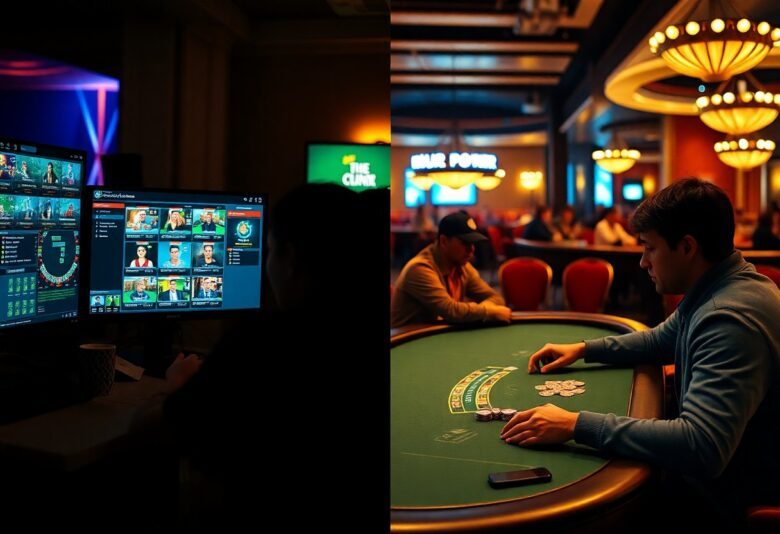This guide explores the distinct strategies required for success in online and live poker. While online poker allows for faster gameplay and greater volume, it demands strong analytical skills and adaptability to various playing styles. Conversely, live poker offers opportunities for reading opponents but requires patience and emotional intelligence. Understanding these differences will enhance your overall game and tailor your approach to maximize success in both formats.
Types of Poker Strategies
Understanding the various types of poker strategies is vital for players aiming for success at the tables. Different approaches apply to online and live environments, with each requiring specific skills to navigate effectively. Key strategies include:
- Bluffing: The art of convincing opponents you have a stronger hand.
- Value Betting: Betting when holding the best hand to extract maximum chips.
- Position Play: Leveraging your seat at the table to gain insights and advantages.
- Reading Opponents: Analyzing player behavior to inform your strategy.
- Bankroll Management: Ensuring your funds last through various sessions.
Thou must adapt these strategies based on your playing environment.
| Online Poker Strategies | Live Poker Strategies |
|---|---|
| Quick decisions and faster play styles | Utilizing physical tells and body language |
| Multi-tabling to maximize play | Building rapport and psychological manipulation |
| Utilizing software tools for analysis | Managing table dynamics and social interactions |
| Focus on timing and bet sizing | Emphasizing slow play and deception |
| Adjusting to various online player types | Observing live opponents for tells |
Online Poker Strategies
In online poker, players often rely on data-driven approaches, making quick decisions without the physical cues present in live scenarios. Important tactics include utilizing advanced software for analyzing hand histories and player tendencies, and employing strategies like multi-tabling to maximize potential earnings. The absence of emotional factors allows players to maintain a focused mindset, which can lead to streamlined decision-making and effective bankroll management.
Live Poker Strategies
Live poker demands a different skillset, emphasizing interpersonal dynamics and the ability to read opponents. Being aware of physical tells and adjusting strategies based on player behavior becomes imperative. Players often engage in bluffing to exploit perceived weaknesses while navigating the psychological aspects of the game. Investing time in position play can greatly enhance decision-making capabilities and improve overall success at the table.
The effectiveness of live poker strategies hinges on the ability to interact and observe opponents, allowing players to gain insights that cannot be accessed through online play. An understanding of game flow and the ability to adapt one’s own play style based on the reactions of other players are vital. Successfully combining elements of social interaction with strategic thinking is the key to thriving in live environments.
Key Differences Between Online and Live Poker
The contrast between online and live poker is significant, impacting every aspect of gameplay from tactics to player behavior. The virtual environment allows for faster game speeds, while live games often involve deeper stacks and more psychological dynamics. Players must adapt their approaches accordingly, refining strategies based on the format they are engaging with.
Game Dynamics
Online poker features rapid action with multiple hands dealt per hour, while live games unfold at a slower pace. This speed variance often leads to different strategic considerations; online players may rely more on statistical analysis, while live players need to focus on physical tells and table dynamics. Additionally, online options often include a wider variety of game types and stakes.
Player Interaction
Interaction among players differs vastly between both forms. Online poker lacks the body language and physical cues present in live settings, making it imperative for players to analyze betting patterns and timing. Conversely, in live poker, reading opponents’ behaviors adds a layer of strategy that can heavily influence decisions.
In live poker, understanding non-verbal cues such as facial expressions and posture can be game-changing. The ability to observe a player’s demeanor when they bluff or show weakness provides insight that is absent online. For instance, identifying a player who tends to fidget when they are nervous can lead to profitable reads. Establishing rapport at the table can also influence opponents’ plays. Personality types, such as the ‘talkative bluffer’, can be exploited by utilizing psychological tactics that won’t be available in a digital context, underlining the importance of engaging with your fellow players thoughtfully.
Tips for Success in Online Poker
To thrive in online poker, players must hone their skills and adapt their strategies. Relying on a mix of solid game understanding and psychological insight can set successful players apart. Consider these necessary tips:
- Study and analyze your play regularly.
- Utilize poker software for game analysis.
- Focus on position and hand selection.
- Manage your emotions to maintain composure.
- Participate in forums to share insights.
Thou must continuously refine your approach for sustainable success.
Understanding Software and Tools
Embracing poker software can significantly enhance your game. Tools like poker trackers and equity calculators allow players to analyze hand histories, monitor opponent tendencies, and improve decision-making efficiency. Familiarity with these tools helps in identifying leaks in your game and adapting strategies accordingly.
Bankroll Management
Effective bankroll management is vital for long-term success in online poker. Establishing a solid bankroll strategy enables players to withstand inevitable downswings while capitalizing on profitable opportunities. Consistently allocating only a small percentage of your bankroll for each session safeguards against large losses.
A common guideline suggests not playing with more than 5% of your total bankroll in any single game, whether it’s tournaments or cash games. By setting strict limits based on stakes and game types, players can ensure their funds last longer and enable participation in higher stakes as skills improve. Regular reassessment of your bankroll, adapting it based on performance and winnings, fosters sustainable growth. This meticulous approach prevents emotional decisions during losses and fortifies discipline. Employing a solid bankroll management plan allows for a robust poker journey.
Tips for Success in Live Poker
Successful play in live poker hinges on understanding both the game and your opponents. Key strategies include:
- Observe player tendencies and adjust your style accordingly.
- Manage your bankroll effectively to withstand the variance.
- Utilize position to maximize profits on strong hands.
- Pay attention to table talk and body language for insight.
- Maintain a calm demeanor to avoid giving away information.
After mastering these elements, you’ll enhance your live poker experience and effectiveness at the table.
Reading Opponents
In live poker, reading your opponents is important. Focus on their betting patterns, body language, and facial expressions, which can reveal their hand strength. For example, a player who fidgets or avoids eye contact may be bluffing, while someone who confidently bets may have a strong hand. Developing this skill can give you a significant edge over less observant players.
Table Dynamics
Recognizing table dynamics allows you to adapt your strategy effectively. Understanding the personalities of your opponents—whether they are aggressive, passive, tight, or loose—can shape your gameplay. Engaging with a passive player, for instance, may require a different approach compared to a highly aggressive one. The ability to shift your tactics according to the flow of the game is key to long-term success.
Table dynamics are influenced not only by individual player styles but also by the overall atmosphere. If there’s a competitive vibe, players might tighten up, leading to more cautious plays. Conversely, a more relaxed table could result in loose actions and bluffs. Identifying whether the table is playing tight or loose allows you to modify your approach, capitalize on aggressive players, and exploit underestimation of your own strength in a hand.
Step-by-Step Guide to Transitioning from Online to Live Poker
| Step | Details |
|---|---|
| 1. Understand the Environment | Familiarize yourself with the physical setting, player behaviors, and house rules in live venues. |
| 2. Adjust Your Strategies | Adapt from a fast-paced online format to the slower, more strategic live play. |
| 3. Practice Reading Opponents | Enhance your observational skills to pick up on physical tells and betting patterns. |
| 4. Join Home Games | Participate in informal games to gain comfort before hitting larger casinos. |
| 5. Manage Your Bankroll | Use disciplined bankroll management suited for longer sessions and varied stakes. |
Adapting Strategies
Transitioning to live poker requires adjusting your strategies to account for a more deliberate pace and the visibility of opponents. Key aspects include focusing on physical tells, utilizing a tighter range of hands, and being more selective with bluffs, as players can better gauge your intentions in person.
Practicing New Skills
To effectively build confidence in live play, participating in practice sessions is imperative. Engaging in home games or smaller tournaments allows you to refine skills such as reading body language and managing emotional responses that differ from online anonymity.
Practicing new skills in a friendly environment provides valuable feedback and experience. Engage with fellow players to discuss tactics, observe reactions, and gradually implement live play strategies into your game plan. It’s particularly beneficial to focus on patience and observation, as these skills sharpen over time and directly impact your performance in high-pressure situations.
Factors to Consider in Each Format
When comparing online and live poker, several distinct factors influence your strategy and approach. Understanding the differences can enhance your performance in either format. Key considerations include:
- Game Speed: Online games progress faster than live.
- Player Reads: Live allows for more observation of opponents.
- Bluffing Opportunities: Vary in prevalence between formats.
- Environmental Distractions: Live settings can have various influences.
- Bankroll Management: Strategies may differ due to accessibility.
Recognizing these factors will significantly affect your strategy and adaptability in different environments.
Environment
The environment in which poker is played greatly impacts decision-making. Online poker offers a sterile, distraction-free setting, while live poker involves numerous sensory elements such as sounds and interactions. This can create both pressure and opportunities for reading opponents, as observing physical tells becomes integral to the game.
Observation Skills
Observation skills are paramount in live poker, where players can analyze opponents’ behaviors and mannerisms. Recognizing patterns, such as betting tendencies or emotional reactions, can give you an edge. Unlike online, where focus is often on the cards and stats, live play requires a keen eye for any physical cues that indicate strength or weakness. Observation skills also involve not just watching others but being aware of your own responses. Maintaining a consistent demeanor helps avoid giving away information. Experts suggest tracking specific opponents over multiple hands to identify habits, thereby enriching your strategic repertoire. The ability to interpret body language and facial expressions can lead to more informed decisions, potentially impacting the overall outcome of the game.
Pros and Cons of Online vs. Live Poker
| Online Poker | Live Poker |
|---|---|
| Convenient access anytime, anywhere. | Enhanced social interaction with players. |
| Variety of games and stakes available. | Real-time physical tells and player reads. |
| Lower minimum bets and fees. | Immersive atmosphere of casinos. |
| Multiple tables can be played simultaneously. | Higher emotional stakes and excitement. |
| Immediate cashouts and easy deposit methods. | Access to exclusive tournaments and events. |
| Less pressure from opponents. | Tactile experience with cards and chips. |
| Availability of training tools and resources. | Create lasting friendships and connections. |
| Less risk of physical intimidation. | Potential for larger jackpot payouts in large venues. |
| Increased focus on strategy and decision-making. | Greater potential for live tells and strategy shifts. |
| No travel expenses or accommodations needed. | Potential for themed events and promotions. |
Advantages of Online Poker
The primary advantage of online poker lies in its unmatched convenience. Players can join games from the comfort of their own homes, with the ability to access a large variety of games and stakes. In addition, online platforms usually offer a plethora of training resources and tools, making it easier for players to improve their skills without the pressure of a live audience.
Advantages of Live Poker
Live poker provides a unique experience characterized by direct interaction and the atmosphere inherent in brick-and-mortar casinos. Players benefit from the social aspect of the game, which can lead to more engaging play and the opportunity to read opponents through physical tells. This dynamic often enhances the emotional thrill and enjoyment associated with poker.
Beyond social interaction, live poker fosters a sense of community and camaraderie among players. Regular attendees often get to know one another, resulting in a friendly competition that can heighten the enjoyment of the game. Furthermore, the tactile sensations of handling real cards and chips bring a sensory dimension to the experience that many players find irreplaceable. Live events also allow for festive themes, tournaments, and an overall immersive atmosphere that online play cannot replicate. This experience can lead to memorable moments that contribute to a player’s lasting passion for the game.
FAQ
Q: What are the key differences in strategy when playing online poker compared to live poker?
A: The primary differences include the pace of play, the amount of information available, and player behavior. Online poker is faster, requiring quicker decision-making, while live poker allows for more observational tactics, such as reading opponents’ body language.
Q: How should I adjust my betting strategies between online and live formats?
A: In online poker, players often use more aggressive betting strategies due to the anonymity of opponents. In live poker, consider adjusting your bets based on player tendencies and emotional cues, as you can gather information from their reactions.
Q: What are some common psychological factors that affect online and live poker gameplay?
A: Online players might experience less emotional stress and can hide behind screens, leading to more risk-taking. Conversely, live players might face pressure from the physical presence of opponents, which can influence their betting decisions and overall gameplay demeanor.




